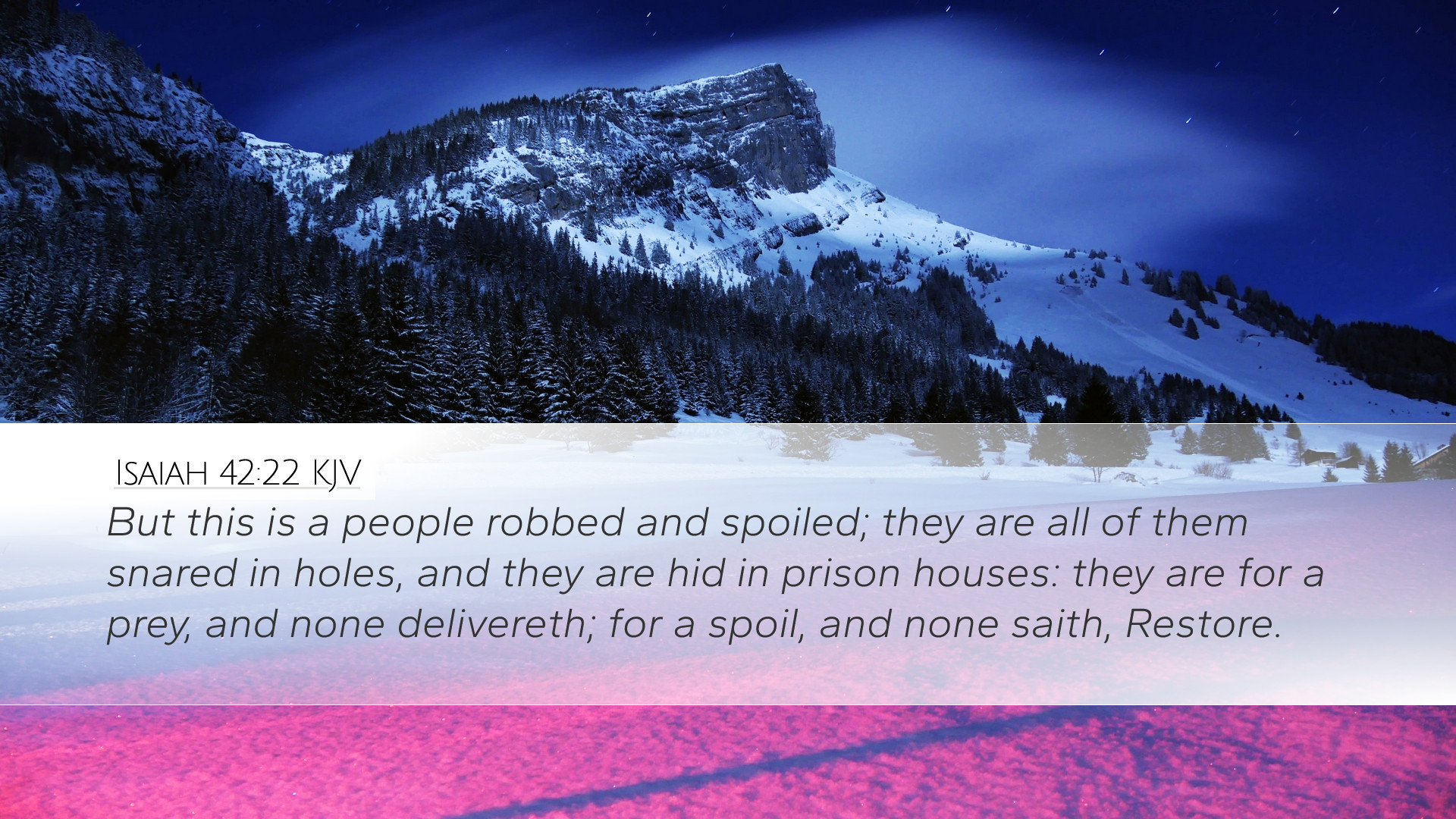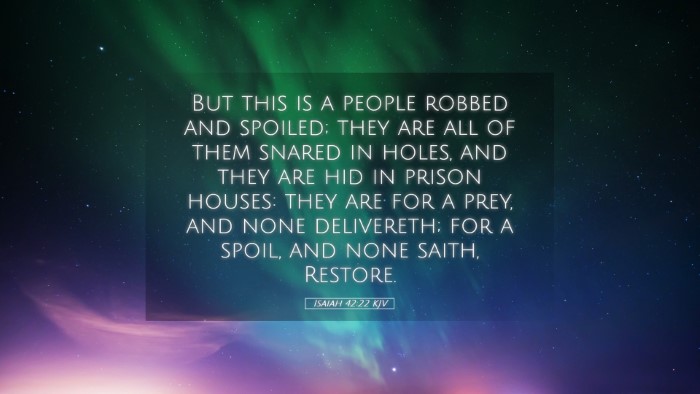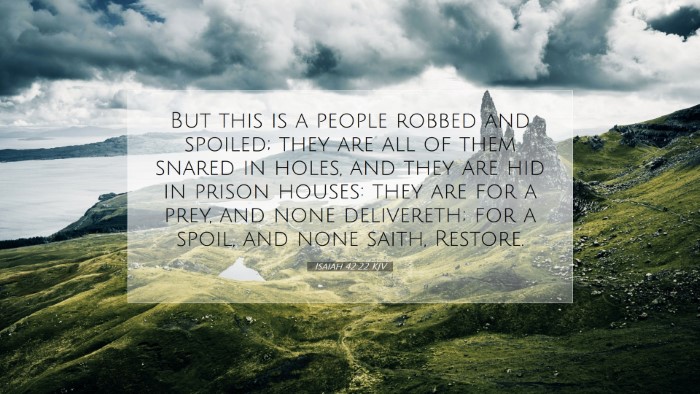Commentary on Isaiah 42:22
Verse: "But this is a people robbed and spoiled; they are all of them snared in holes, and they are hid in prison houses: they are for a prey, and none delivereth; for a spoil, and none saith, Restore."
Introduction
The prophet Isaiah, in this passage, presents a profound revelation concerning the plight of God's people. This commentary seeks to explore the depth of Isaiah 42:22 through insights from various public domain commentaries, notably those of Matthew Henry, Albert Barnes, and Adam Clarke. The intent is to provide a robust understanding that will resonate with pastors, students, theologians, and biblical scholars.
Context of Isaiah 42
Isaiah 42 is a pivotal chapter that introduces the Servant of the Lord. This servant signifies hope and restoration amidst darkness and despair. Isaiah's message encompasses both a prophetic foretelling of the Messiah and an urgent warning regarding the condition of God's people.
Historical Background
Isaiah ministered during a tumultuous period in Israel’s history, marked by idolatry, social injustice, and political strife. The Israelites had faltered in their covenant with God, leading to oppression and exile. This backdrop is essential to understanding the desperate situation described in Isaiah 42:22.
The State of the People
In examining the phrase "a people robbed and spoiled," we recognize the spiritual and physical degradation faced by the Israelites. Matthew Henry elaborates that this reflects both their temporal losses and their plundered spiritual condition.
- Robbed and Spoiled: The Israelites are depicted as victims, stripped not only of their earthly possessions but also their spiritual dignity. They have been deprived of true worship and fellowship with God.
- Snared in Holes: This imagery suggests entrapment; the people are caught in predicaments from which they cannot escape. Clarke emphasizes the idea of being ensnared by their sins and the consequences thereof.
- Prison Houses: The reference to prisons indicates a lack of freedom, both physically and spiritually. They are confined in a way that reflects their bondage to sin and foreign powers.
The Desperate Condition
Isaiah’s description culminates in a depiction of hopelessness: "they are for a prey, and none delivereth; for a spoil, and none saith, Restore." This assertion reveals two critical points:
- Predatory Nature of Their Oppressors: The metaphor of being prey signifies vulnerability. Barnes interprets this as the people being easy targets for their captors, indicative of the larger spiritual fight against evil.
- Lack of Deliverance: The absence of restoration speaks volumes about the state of leadership among the Israelites. There is a notable silence from those in power; no one advocates for their release or seeks to remedy their plight. Clarke notes this reflects broader societal failures to protect and provide justice.
Spiritual Implications
The implications of Isaiah 42:22 transcend its immediate historical context. The struggle of God’s people is a timeless theme, one which resonates with believers throughout the ages.
Theological Reflections
Isaiah reveals human depravity and the resultant need for intervention. The plight of the Israelites serves as a metaphor for all who find themselves caught in sin, lost, and without hope.
- The Burden of Sin: The "holes" and "prison houses" symbolize the effects of sin on the human soul. Matthew Henry offers insight here, articulating that sin ensnares individuals, rendering them incapable of liberating themselves.
- Hope for Deliverance: Although the state of the people seems dire, the chapter leads towards a message of hope in the Servant of the Lord who would ultimately bring restoration. This anticipatory hope is critical for understanding God’s redemptive plan.
Application for Today
For pastors and Bible teachers, this verse serves as a powerful reminder of the need for compassion towards those caught in spiritual and physical bondage.
Pastoral Insights
It is essential to recognize our responsibility as ministers to deliver the message of hope and restoration. Henry stresses that we must not only preach deliverance but also actively seek it, engaging with those who are suffering and advocating for their needs.
- Advocacy for Justice: Just as the Israelites were overlooked in their time of need, many in today’s society face similar oppression. Churches must be places of refuge and advocacy.
- Emphasizing Restoration: The call to ’restore’ is vital. Pastors are encouraged to instill hope through the gospel, helping to lead individuals out of their spiritual prisons and into a vibrant relationship with Christ.
Conclusion
Isaiah 42:22 encapsulates profound truth concerning human suffering, divine justice, and the need for hopeful restoration. Through exploring the insights of trusted commentators, we gain a richer understanding of both the historical context and the timeless nature of this scripture. Ultimately, it is a call to recognize our own entanglements with sin and to seek the liberating power of the promised Servant, bringing restoration not only to ourselves but also to a world in desperate need of hope.


